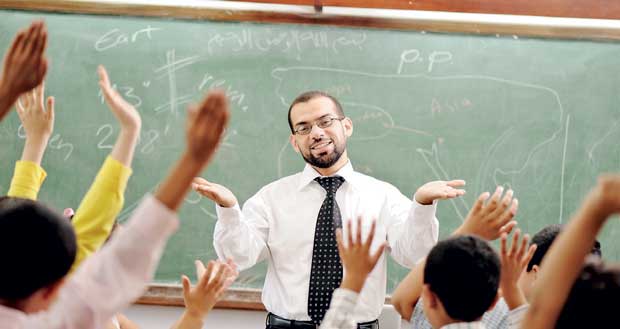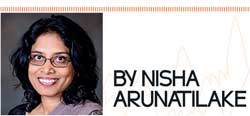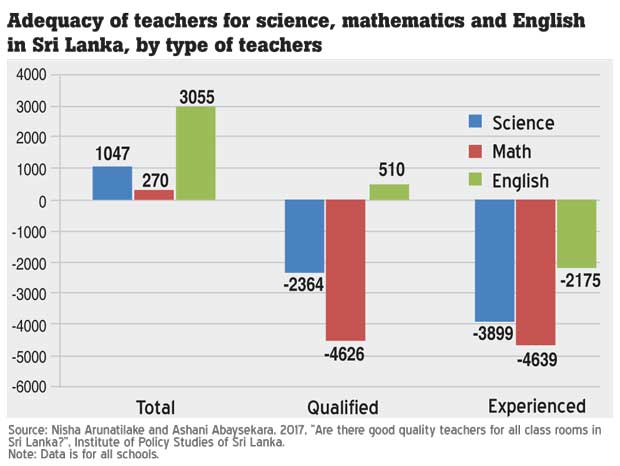16 Nov 2017 - {{hitsCtrl.values.hits}}

 The 2018 budget proposals presented in parliament on November 9, 2017 have correctly recognized the importance of good quality teachers for improving education in the country. The budget has allocated Rs.50 million to increase the allowance given to teacher trainees to Rs.5,000 a month and allocated another Rs.50 million for the establishment of a centre for training English teachers.
The 2018 budget proposals presented in parliament on November 9, 2017 have correctly recognized the importance of good quality teachers for improving education in the country. The budget has allocated Rs.50 million to increase the allowance given to teacher trainees to Rs.5,000 a month and allocated another Rs.50 million for the establishment of a centre for training English teachers.
Highly qualified teachers in all classrooms are necessary for implementing education reforms aimed at modernizing and improving education in the country, as such proposals for improving teacher training are welcome. But, a recent Institute of Policy Studies of Sri Lanka (IPS) research, conducted using the school census data for 2016 shows that there is no shortage of teachers for English language, science and mathematics at national level.
However, there is a shortage of qualified and experienced teachers to teach these subjects. This shortage is apparent at national as well as sub national levels. The shortage is worst for mathematics teachers, followed by for science teachers.
Who is a qualified teacher?
We consider a teacher who has either a degree in a particular subject or have been specially trained to teach a particular subject to be a qualified teacher (i.e., a teacher with the subject knowledge to teach a subject).

Who is an experienced teacher?
Usually teachers are recruited to Class 3 of the teacher service. Only those with a degree in education are directly requited to Class 2 – Grade II. Those who have been recruited to Class 3, depending on their initial recruitment, need to obtain three to five years’ experience in teaching and pass the efficiency bar exam to be promoted into Class 2 – Grade II.
This suggests that all Class 2 teachers are with subject and pedagogical knowledge as well as with at least three years of experience. Hence, in our analysis we consider the teachers with a grade higher than Class 2 – Grade II to be experienced teachers.
How do we measure teacher adequacy?
The teacher cadres for each school in Sri Lanka are determined according to the guidelines detailed by the Education Ministry. These guidelines take into account the number of classes in the school, the number of subjects taught in the school and the medium (i.e., Sinhala, Tamil or English) in which these subjects are taught.
In this article, the recommended number of teachers is referred to as RT. The school census data provides information on the number of teachers who usually teach a subject in a school. We take this as the number of available teachers (AT) to teach a subject in a school. When the available teachers are less than the recommended number of teachers (AT<RT), there is a teacher shortage; when the available teachers exceed the recommended number (AR>RT), there is a teacher surplus.
Do we have enough teachers to teach mathematics, English and science at national level?
Our analysis shows that Sri Lanka has a surplus of teachers for mathematics, science and English subjects. In Sri Lanka, the number of teachers who mostly teach English, mathematics and science are more than the number recommended by the Education Ministry in the first circular of 2016 on determining the staff numbers in a school. The largest surplus, with 3,055 more teachers than recommended, is seen for English teachers.
However, when we consider experienced or qualified teachers, there are large teacher shortages for mathematics and science subjects (Figure). The shortage of qualified teachers (both novice as well as experienced) are apparent in all provincial schools in all provinces for mathematics and science teachers. The teacher shortages for English teachers are seen in Northern, Eastern, North Central, Uva and Sabaragamuwa Provinces.
Way forward
The findings of the study show that the country has a large deficit of experienced and qualified cadre of teachers to teach mathematics, science and English. The teacher training and teacher recruitment in the country are inadequate to meet the need for qualified teachers. As a result, a high share of novice teachers recruited to teach different subjects is not qualified to teach those subjects.
Although once recruited the teachers are provided with in-service training to upgrade their skills, this process takes time to produce quality teachers. In the meantime, children are without access to a quality teacher.
The existing facilities to provide pre-service teacher training needs to be improved, expanded and made more relevant. At present, pre-service teacher education is conducted by the universities, colleges of education and different teacher training centres.
Improving and expanding the pre-service training of teachers and giving priority for recruiting teachers with proper pre-service training can help to improve the availability of qualified teachers. Such training programmes should especially cater to the demand for teachers in different subject areas.
Teachers should be certified to teach different subjects while the subject knowledge of teachers should be taken into consideration when filling vacancies. At present, teacher recruitment does not consider subject knowledge. As done in other countries, all teachers should be certified in their ability to teach a subject. Only under very special conditions should teachers be allowed to teach the subjects that they are not certified to teach.
In this regard, the proposed budget allocations for improving teacher training are a welcome initiative. However, the budget allocations should not only be made for improving the training facilities of English teachers. They should also be improved for training science and mathematics teachers. This is especially necessary, given the emphasis given in the budget for improving science, mathematics and technology training in the country.
(Nisha Arunatilake is a Research Fellow at the Institute of Policy Studies of Sri Lanka (IPS). To talk to the author, email [email protected])
04 Jan 2025 4 hours ago
04 Jan 2025 4 hours ago
04 Jan 2025 5 hours ago
04 Jan 2025 5 hours ago
04 Jan 2025 5 hours ago